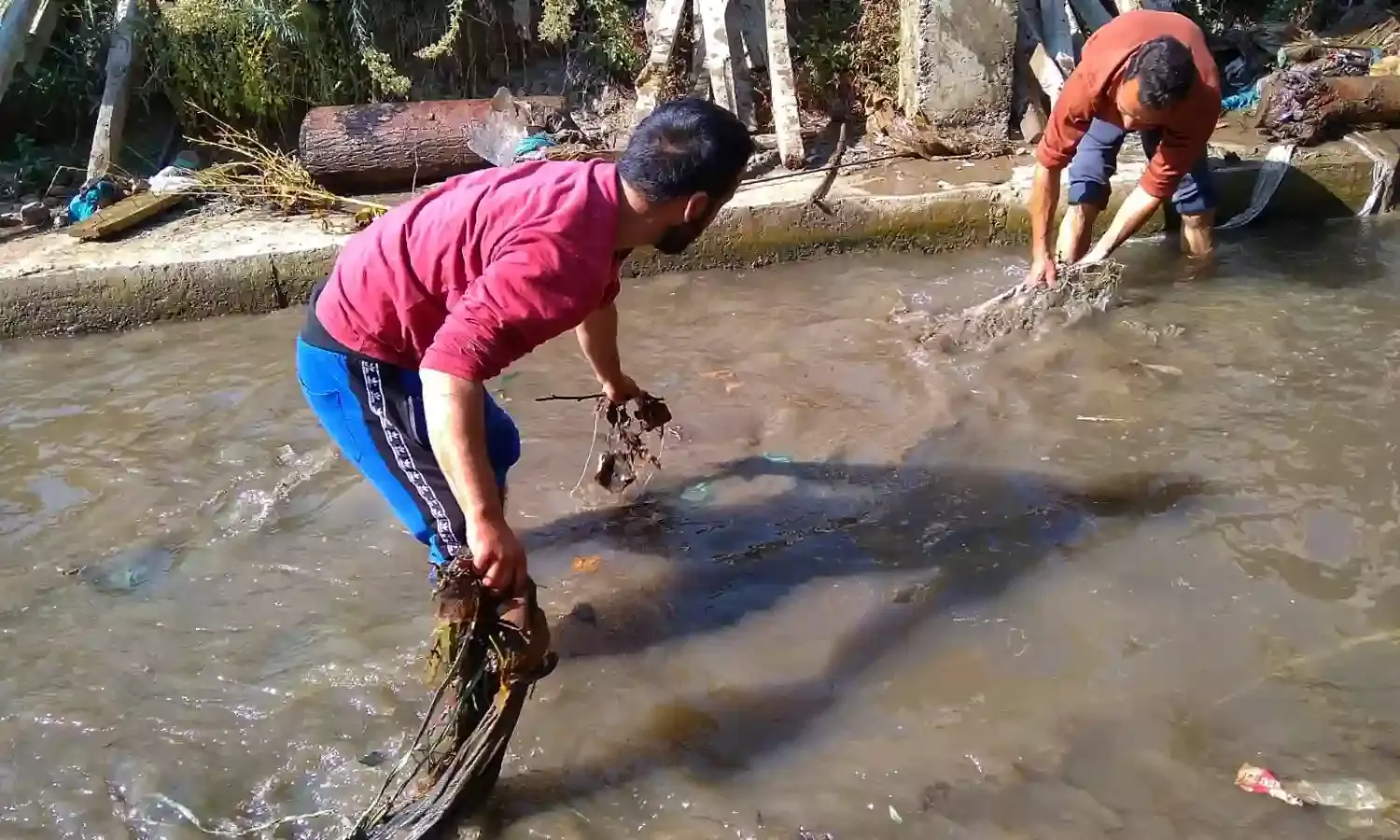An SOS from Bandipora's Water Bodies
Major water bodies in north Kashmir's Bandipora district are turning into dumping sites

In the absence of a proper solid waste management plan in place, major water bodies in north Kashmir's Bandipora district are turning into dumping sites. Bandipora district was known for three things: Alim (knowledge), Adab (literature) and Aab (water). However, its water bodies are now struggling to survive as sewage and garbage are flowing into them.
The major water channels passing through several areas of the district including, Arin-Nallah, Kehnusa, Kuloosa, Gundpora, Aragam and Ajas have now turned into dumping sites. Villagers throw household garbage on the banks of these water channels, turning them into dumping sites.
Rising pollution and high-nutrient load continues to flow and gather on the surface of the water, which locals had used for drinking decades ago. "The water bodies are vanishing in Bandipora, and are no longer a treat for the eyes," said Gulam Qadir, an elderly resident from Bandipora.
The locals said that even the freshwater springs in the district, some said to be over 100 years old, are wallowing in neglect. They say the authorities have been apathetic towards even the oldest spring that has now become a garbage dumping site in Gamroou village. Once the water from this spring was used by the locals for domestic use.
Mukhtar Ahmad an environmentalist said that urgent action needs to be taken to clear these water channels of plastic waste. Else it poses a serious health hazard for the residents. "The district which was once known for its clean water resources is now slowly losing this identity. If you look at the streams of the district, you will see garbage on its banks. This is unfortunate," he said.
People, Ahmad added, have to come forward to take care of these water channels. "Unless the people take care of these things themselves, the administration cannot do anything," he said. Ahmad believes that the small canals in the villages are also disappearing due to garbage being dumped there.
Many other canals are suffering a similar fate as untreated solid and liquid waste is being discharged directly into them. The district's Arin stream, well-known for being a trout fishing spot, is also dying a slow death.
Local resident Mushtaq Ahmad, said that people unfortunately throw the garbage on the banks of this major fresh water stream in the morning and evening time every day. He said that the Arin-Nallah has become polluted at Gamroo village that it passes through.
"Despite the looming risk of jaundice and other water-borne diseases spreading during the monsoon season It needs community and administration intervention to safeguard it from further pollution," Ahmad said.
Meanwhile, a visit to another stream at Gundpora Rampora near the bridge revealed tons of stinking garbage dumped at the banks. "Even animal carcasses are dumped here and as a result the quality of this stream has deteriorated further. Till some years ago we were using the water for drinking," Mohammad Shaban, a local resident, said..
Dumping garbage, including plastic, continues to affect the 200-year-old stream in Gundpora village. Now the locals want effective steps to be taken so that the glory of the stream gets restored. Mohammad Rafiq Wani a local social activist who has been fighting for many years to save these water bodies from pollution said that apart from the administration, the people should come together to save these water bodies. "A few years ago, the water of these rivers was being used for drinking, but now it it too polluted," he said.
Once known as Asia's largest freshwater lake, Wular lake located in the same district is now struggling to survive. The water body is choking with sewage and garbage, which is leading to its slow death. It has also shrunk to nearly half its original area in the last few decades due to administrative apathy, extensive pollution, siltation and encroachment.
Wular Lake, had been notified as a Ramsar Wetland in 1990, and had the potential to be a great tourist destination. The lake was once the main source of fresh water and livelihood for hundreds of families in Bandipora and Sopore areas of North Kashmir. It was also famous for producing high-quality fish and water chestnuts, but none of that is visible now.
According to locals, the municipalities of Bandipora and Sopore are dumping their solid waste into the water body daily. Imtiyaz Ahmad a local fisherman from Zalwan village on the shores of Wular Lake said that the area has completely been turned into a dumping site. He alleged that it was "the sanitation staff working with Bandipora municipality who collect all garbage from various areas of town and dump it near Zalwan area at night time or early morning".
"Even biomedical waste collected from the local government district hospital is also dumped near the same area," said Mujtaba another local, adding "It is not only Zalwan area which is used as a garbage dump. Other low lying areas along the lake are also being used to dump domestic and commercial waste".
Assuring immediate action, an official said that strict legal action will be taken against those found involved. "Mass awareness programs will be held in the villages in coming days on how we will save these resources from pollution," he said.
In a bid to ensure cleanliness in rural areas, in Arin Block near the stream the administration had introduced solid waste management, by establishing the first garbage and plastic centre, said the official adding "this is a key component of Swachh Bharat Mission (SBM). We are thinking of introducing solid waste management (SWM) on an experimental basis. Depending on the feedback, we will decide on extending it in more villages."



